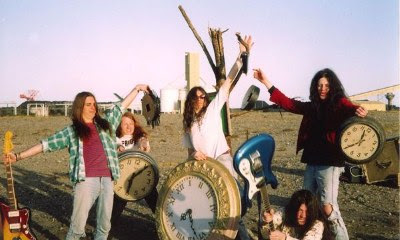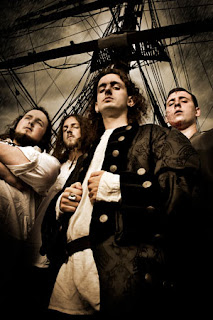After Surviving the collapse of taste-making label Creation, scathing self-criticism and the 1990s in general, Scotland's Teenage Fanclub have heralded their 20th year in the biz with a new album, Shadows. According to the UK media, the band fans dubbed 'The Fannies' 1991 album, Bandwagonesque, was the best release of the year (controversially beating Nirvana's Nevermind). Yet critical acclaim rarely seemed to influence, for good or bad, the group's subsequent releases, and they've often seemed perversely self-destructive. Perhaps it's this apathy to outside perception that has helped maintain Teenage Fanclub's creative core over hit song making approach to music. As singer/lead guitarist Ray McGinley points out during our interview, "It is the band that has to live with the songs they make, and love them too, even the ugly ones." That said, I wonder have Teenage Fanclub, 20 years on from debut album Catholic Education, hit their peak with Shadows.
"Whether we're at our peak or not it's probably up to other people to decide." Ray begins on the subject of his band's new album. "I think we're comfortable with where we're at and with the new record so our relationship with our collective, creative sides is fine. With that in mind, I'm sure there are people who will think what we're doing now is crap and only be interested in what we did 20 years ago, but that's fine as well." Teenage Fanclub began in Glasgow in the late 1980s, following a false start as the hilariously named noise-pop band, Boy Hairdressers. Since then they have held claim to the title of 'Creation Records longest post-collapse survivors' now that Oasis have split. McGinley has doubtfully even considered why his band have flourished for so long, as they have continually made music to please themselves above all. "Sometimes when you're in the middle of making an album you forget that other people are actually gonna hear it and so when you release something new and goes out into the world, it can be surprising to hear any kind of feedback from the public." He considers "I mean it's great when you hear people like what you do, because making the albums you lose all objectivity, but I don't think we've ever made music as a way of gaining popularity or anything."
During the bands early years, the emphasis was often on capturing the moment when recording, thus various cacophonous noise-pieces made their way onto Teenage Fanclub albums. The rate at which they recorded was unusual for any band - they put out three records in under two years including The King (1991) – which was deleted within 24 hours of release. However non-rush to follow up last release Man-Made (2005) was a little out of character. Ray explains, "We decided to take some time before we recorded anything to just do other stuff for a time, individually, and that ended up being a lot longer than we initially planned." He laughs, "We didn't take very long to record the actual album, it was all pretty much done back in 2008, but we did take our time mixing it and then had another break after it just to let it mature for a while before we dealt with all the stuff that goes along with releasing an album."
The lack of urgency in finishing and releasing Shadows could be the sign of a band under no pressure to follow up some massive hit album, but more likely it's a confident step forward for Teenage Fanclub who, as their own biggest critics, found a happy medium of music that satisfied them and a workload that wouldn't unduly pressure them. "It's just nice to live with the work for a time before everything starts happening, like all the promotion and rehearsal commitments, when suddenly it feels like a job." Ray adds, "But then going out and playing for people, who come up and talk to us after the show and who've got the new album with them, is a great feeling and then you tour for two years or something and that feeling just stays with you." He continues, "We're in rehearsal at the moment trying to get to grips with re-learning how to play some of the (new) songs again. When you're in the studio making the album, you only need to get it right once and so you're not that well versed in the songs as you would be playing them night after night." He describes, "We're hoping we can work out everything on the record so we can play it live in full like we did with our last one."
In performing complete albums on tour, Teenage Fanclub are able to share equally the vocal and written workload. McGinley, Norman Blake and Gerard Love have a long tradition of singing and writing equal percentages of the bands' albums, similar to their '60s counterparts the Beach Boys. A massive back catalogue of work now means an even greater share of live duties, but also the challenge to strike a balance between the ease of familiarity and fully exploring new material. Ray continues, "I remember, going back to 1990 when we put out our first record Catholic Education, which had less individual members songs, and we'd played that album live, like hundreds of times, and we had a set which we kind of stuck to, then in 1991 we released Bandwagonesque and suddenly we had to play all these new songs and, even to this day it still takes a while until you really feel comfortable playing new the songs along side the old ones." He claims, "There's a real sort of strangeness to them until you've taken them out around the world and lived with them for a time." Ray laughs. "There's a new song called Dark Clouds, which Norman (Blake) sings and there's no guitar on it, so we're trying to work out now how we're going to play it live – as in can he play piano and sing at the same time, because it's quite a difficult song to play, and if he gets someone else to play it, will he feel a bit strange standing there just singing without his guitar!" He exclaims, "So you see what I mean about having to re-learn how to do this thing that we've been doing or over 20 years now whenever we have new songs."
There's so much humility in Ray's voice as he speaks about his music. The idea of new songs having to be 'grown into' and old ones being 'comfortable' is the language of a man fully into his craft. Yet the band have been known to give themselves a harsh serve when any apparent 'below par' music's been produced. Ray on the theme of self-criticism, "I think we always try and get our music to be as good as it can be, and that includes playing live as well as studio recordings, but we don't get too uptight about it. I mean you're never going to be able to recreate your record live, it's gonna be another kind of thing and we're always aware of that, but I think we're very self-critical when we play, for sure." Indeed Teenage Fanclub have taken self-depreciation to levels not often seen in music. In one case, at its initial promotional stage, their 1993 release Thirteen was widely dismissed in the UK press – only not by bitchy journalists – but by the band themselves. Not an exercise in reverse psychology, Ray points out, but more a slip of the tongue. "We were probably too publicly self-critical in the case of that album." He laughs, "I think the longer you work on something, and at the time that was our longest period making an album, the more anti-climactic the result can feel. We were genuinely unsatisfied with it and we knew we should have done it a lot better, but the fact that we were so vocal about it meant that the media, of course ran with it."
In a kind of unprecedented twist, Teenage Fanclub's follow up to Thirteen, 1995's Grand Prix, was championed as one of the best British album's released all year – and one that the band were this time keen to vocalise their happiness with. The sound on that album was a strong indicator of what was to come, as the lads from Glasgow moved away from their shoegaze roots and onto 3 part harmonies. The latest, Shadows, is close to full with hooks and harmonies channeled straight from 1960s California via Glasgow, and picking up a little XTC on the way. It's on my comparison with Swindon's now defunct oddball-poppers, XTC that Ray interjects; "I don't think I fashion myself on any particular singer, I just try and sing in tune as best I can." He says laughing, "But it's funny because I really like XTC, but I don't think I've ever sat down and actually listened to a whole album." Ray adds, "I do like their attitude though, they seem to be against all the bullshit side of music and just stay recluse and maybe release something every ten years or so." He smiles, "That's something I can definitely appreciate now."
lEIGh5



























